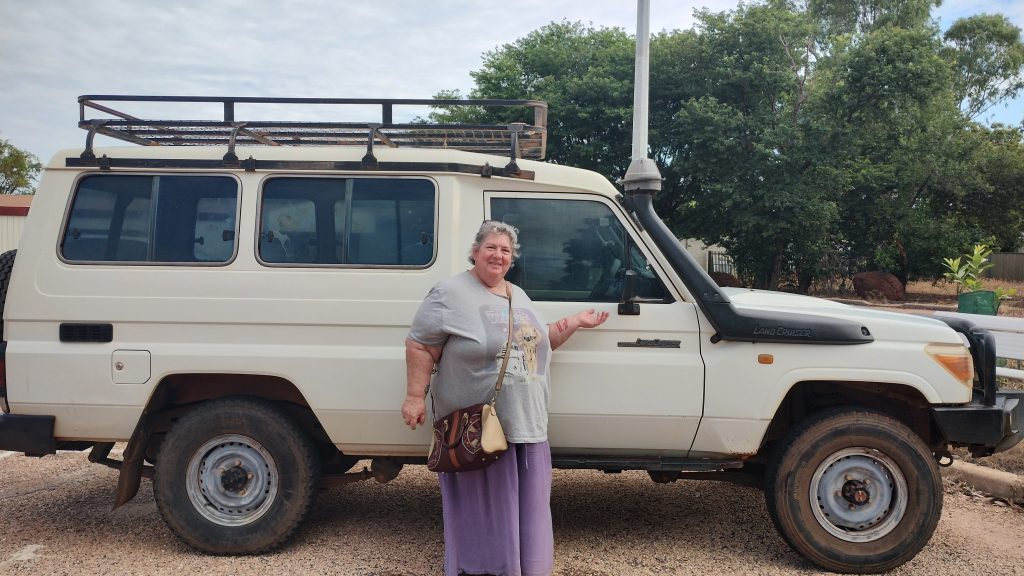
“The Flying Squad is a group of teachers who are experienced enough to be able to walk into any school and fit in with the students, staff, and the ethos of the school. We travel to any school that is having difficulty with staffing and is not in the metropolitan area. We often fly (hence the name) but can sometimes drive to the posting,” said Penny Goodwin.
Read the latest print edition of School News HERE
Cassia Education Support Centre is located in the Pilbara region of Western Australia, a stunning region rich in natural resources. It’s closer to Bali than to the Department of Education’s main offices in Perth. Unfortunately, its distance can make finding relief teachers tricky.
Penny Goodwin is in her second year on the Flying Squad. In that time, she has travelled to Derby in the north, Collie in the south, and Kalgoorlie in the east. She’s currently in Port Hedland, more than 1600 km north of Perth.

“I joined the flying squad at the end of 2022. I liked the idea of seeing the many awesome sights our state has to offer, but I think the most important reason I joined is not easily stated. I wanted to be able to concentrate on the students, with providing the best learning opportunities I could.” Penny Goodwin.
Despite what many might assume, Penny points out that working on the Flying Squad is not the same as relief work: “The work is essentially the same as if I were a full-time teacher at the school. We are expected to plan lessons, mark, and write reports. We need to learn as much about our students as we can in a short time frame in order to tailor the lessons to student’s interests.”
Tiri Singh has 44 years of teaching experience in South Africa, New Zealand, and Australia and is now in his second year on the Flying Squad.
Placements can be anywhere across the massive regional and remote areas of Western Australia and typically last between four to ten weeks. “Every deployment has been a very good experience,” says Tiri. “I must, however, single out Kulin District High School as a school where students are very happy and there are almost no behaviour challenges at all.”
At a relatively close 300km distance from Perth, Kulin is located in the picturesque Wheatbelt region east of Perth, with the District High School catering for students (K-10) from the Kulin, Kondinin, Dudinin and Pingaring areas.
Like Penny, one of the reasons Tiri joined the Flying Squad was to “experience the different physical and social landscapes, demographics and lifestyles of this vast land we call Western Australia.”
Perhaps the Flying Squad is the best-kept secret of how to see Australia’s most varied and expansive state, while being paid. “The Teacher Flying Squad is an outstanding opportunity to see Western Australia, and experience teaching in a range of locations and contexts,” admits Jim Bell, Deputy Director General, Student Achievement with the WA DoE.
A Certain Kind of Teacher
However, not all teachers are suited to the uncertainty and everchanging nature of work on the Squad.
Deputy Director Bell says: “Given the short-term nature of these appointments, teachers who can build positive and productive relationships quickly and easily with staff, students and the community thrive in these roles.” He adds: “Not all locations have the comforts many of us are used to, so being flexible, resourceful and resilient are valuable attributes.” Accommodation can range from apartment hotels, B&Bs and units to high-quality caravan parks.
“To succeed in this role, one must be able to firstly, and quickly, make a good impression on students and staff,” says Tiri. “In addition, one must be able to adapt quickly to living in different towns and be able to interact positively in communities that are different from urban settings.”

Adaptability is an essential skill of the Flying Squad. Not only having the flexibility to be constantly moving and meeting new people, but as Tiri points out, sometimes the role requires you to teach out of field.
“[You] might sometimes have to teach in a learning area that you are not entirely familiar with. You are required to be resourceful and innovative. This role has also been a reminder that as a teacher, one has to be open to new learning every day.” Tiri Singh
This confidence to step into the unknown, coupled with a willingness to learn, is perhaps a combination few people possess.
“I believe that this type of work is very rewarding,” says Penny. “It would suit those who don’t have young children (or pets) at home. Their home base needs to be such that they can leave it for a few months without worrying. Being able to enjoy their own company is important. They also need to be flexible, and able to walk into a classroom without an in-depth knowledge of the subject to be taught. They need to be able to listen to the permanent teachers, who know the students, and learn from them.”
Constant Change
While the official line is that Flying Squad staff should be ready to go with a day or two’s notice, Jenny says it’s rarely that close. “[Usually] I found that I was given the next posting while I was still at the last one, which gave me time to plan and organise. Mostly, by the end of one term, I knew where I was going for the next term.”
Tiri agrees: “Schools are very helpful in the transition process and there is usually a term planner in place. The Flying Squad administration usually contacts me a few weeks in advance and discusses a few options before a mutual decision is made.”
Squad members are given support throughout the entire process including flights or a car, accommodation and allowances.
“When a Flying Squad teacher accepts a deployment, the Department funds travel and accommodation costs associated with the deployment. If Government Regional Officer Housing Program (GROH) is available, the employee will be housed there, if not, they will be housed at other temporary, short-stay accommodation in the area,” says Deputy Director General, Jim Bell. “Flying Squad teachers travel to their designated locations via air or road depending on the distance and preference, committing to a minimum stay of four weeks and potentially extending until a long-term replacement is secured. Upon completion of their assignment, they return home, or move on to another location.”
Each state will have their own methods and teams for providing short-term deployment to remote and regional schools, but the opportunities and benefits would be similar.
For Jenny, it has been a valuable experience:
“The Flying Squad has taught me to be flexible, to work under different management systems, and to value the experiences of staff and students that I meet. There are a lot of extremely knowledgeable teachers in our Education Department, and it is a privilege to work alongside them. I have learned something new at every posting, and this continues to help me better myself as a teacher.”







